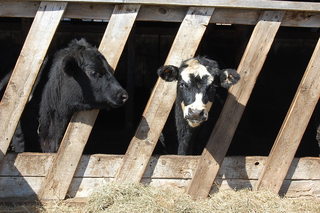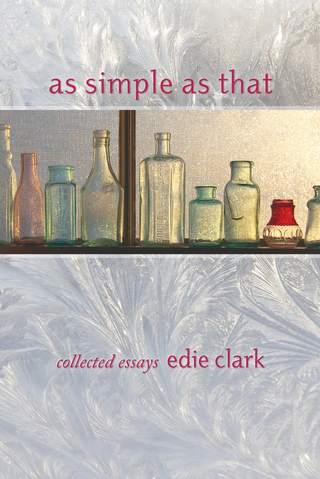Welcome

Daylight Nuisance time
“A day is as long as it is going to be. No moving of the clocks can make a difference in the length of our days… I know of a farmer in the state of New Hampshire who does not observe this ritual. The cows know milking time, he says, in spite of what the clock may say. He calls this Daylight Nuisance Time and lives half the year out of sync with the rest of the country.”
-Excerpt from As Simple As That. Available on Amazon or edieclark.com or The Toadstool

The new collection of essays, entitled "As Simple As That," is now available for order. This collection celebrates a career landmark of writing the two columns ("The Garden at Chesham Depot" and "The View from Mary's Farm") in Yankee for 25 years.
If you are not a newsletter subscriber, now is a good time to sign up. Click "Mary's Farm" on the above menu for the free newsletter subscription.
New events are being scheduled and the list of events will be posted and updated in the next few days.
Here is some of the praise As Simple As That has already received from a few who had the manuscript in advance:
"Reading Edie is like listening to beautiful music."
__Judson D. Hale, Sr.
Editor-in-chief of Yankee magazine and author of "The Education of a Yankee"
Delivered in an elegant style, these essays are lessons on how to live in small-town New England: kite flying on a frozen lake, ways to cook green tomatoes, keeping an old house, searching for a dog caught in a tornado, wood heat, coping with spring mud. Taken as whole, they are a philosophical inquiry into what some people call mindfulness. Clark teaches us how to pay attention to the moments that make up our lives. This is a beautiful book about love, grief, and the natural world. It reads like a how-to manual but feels like a lyric poem. I was deeply moved by it.
__ Ernest Hebert, author of "Howard Elman's Farewell"
My only regret with As Simple As That is that it came to an end. Each essay is a narrative gem about the pleasures and duties of life on this planet, sharp-eyed and warm-hearted, as deeply rooted in the soil of New England as a Robert Frost poem.
__ Richard Adams Carey, author of "In the Evil Day"
Edie Clark's Yankee column is a national treasure. This book glows with a life closely and kindly observed, days well-lived and well-loved. Reading this book will make you feel like you are sitting in her warm, sunny kitchen, listening to her tell you heart-warming, spell-binding stories.
__ Sy Montgomery, author of "The Soul of an Octopus"
Edie Clark's clear-eyed and lyrical essays capture the essence of New England's weather, seasons, landscape and wonderfully independent-minded natives the way Wendell Berry's writing evokes the natural world of Kentucky. In the tradition of Frost, Thoreau, and Emily Dickinson, Ms. Clark shows us how the small and large satisfactions of living close to nature can inform life with grace, meaning, and beauty.
-- Howard Frank Mosher,
author of "God's Kingdom"
I first met Edie Clark as a reader which introduced me to her quiet style, her sure eye for detail, and her compassion for the people she meets along the way. All of Edie's writing breathes at the right rate. Her sentences have enough room in them for her readers to feel at home.
__ Howard Mansfield, author of "Dwelling in Possibility, Searching for the Soul of Shelter"
Here are notices about Edie's book, What There Was Not to Tell:
“In What There Was Not to Tell, Edie Clark sets out to fill in the details of the gaping hole that was created in her family’s life by the death of a man she never met. What she discovered is a riveting story that is tragic yet triumphant, uniquely personal yet universal. This is a surprising and thoroughly compelling tale of how a single casualty of war can set off chain reactions of heartbreaking loss, undying love, and unshakable loyalty across multiple generations. At the same time, it is an incredible piece of family detective work that keeps taking unexpected twists and turns.” – Dayton Duncan, author of The Dust Bowl and The National Parks: America's Best Idea
"An amazing account that will keep you turning the pages from beginning to end. Clark has written a thoughtful, interesting and gentle book that will capture your heart and your imagination, and perhaps make you think a little bit deeper about life, love and war."
-- Paul Collins, The (Nashua) Sunday Telegraph
“Haunting.” -- Tim Clark, Yankee magazine
“A moving book. Beautifully written.” – Rebecca Upjohn Snyder, author of The Last Loon
"In the letters, the word "death" appears nowhere. Astounding. This "not there" reverberates throughout the book. EC's story and perseverance takes us deeper and deeper and then even deeper."
--- Sandy Diamond, poet, playwright, author of The Hunchback; Miss Coffin and Mrs. Blood.
“A powerful story of love, war and the lingering effects of the tragedy of war that is as intimate as it is universal. With What There Was Not To Tell Edie Clark establishes herself as one of the premiere writers of memoir working today.”
–Rebecca Rule, author, columnist for the Concord Monitor.
“Clark writes this book with a gentle touch, and a bit of Tolstoy, as she deals with the anguish of lovers inflamed by love and World War II and maddened by the savagery of wartime. An extraordinary interweave of letter excerpts, military logs and narrative, revealing a love that can last longer than a world war.”
---Steve Sherman, Keene (NH) Sentinel
“In this story of love and loss, pain and poignancy, sorrow and stoicism, Clark weaves together a tapestry of conflicting emotions. What There Was Not To Tell reflects an important part of World War II that doesn’t get enough light shed on it: What happens after? What does coming home look like?”
---Jon Potter, Brattleboro (VT) Reformer
Selected as "book of the week" by the New Hampshire Library Assoc.
About the book:
My parents died in 1994, leaving me more than two thousand letters, written during World War II. To some extent, I knew the story of Tom but the letters allowed me to understand him within the context of that war, which I had never understood nor known much about. The name of the book comes from the fact that, whenever I asked my father to tell me about the war, he would answer, “There’s nothing much to tell.” The letters told me a great deal that my parents did not, not only about themselves but about that war and war, in general. Through reading the letters, I came to believe that my generation was deeply affected by World War II, without ever really knowing it. The silence of our fathers (and mothers) may be from unprocessed grief and the famous “generation gap” may have been a direct effect of our fathers’ service coupled with their inability to articulate what that war had meant and how much (how many) had been lost to accomplish what they did.
The book is in the form of an odyssey, finding not only Tom’s final (of four) resting place but also the description of his death, reconstructed from Air Corps records and memories of those who fought nearby. I use extracts of the letters to give voice to both my father and mother, as well as to Tom. These extracts interspersed with my memories, thoughts and revelations as I make this journey into a past I never knew.
I've posted all the readings (constantly updating) I have lined up to present this book, which was more than 15 years in the making. For me, this book is a complete labor of love, a quest to unlock the secrets my parents held until their deaths. As a result of reading their letters, I know now what I wish I had known, growing up. I never understood them in the way that I do now and it is with great sadness that I remember my impatience with them, their odd choices in life, their particular habits. I had no way of knowing that what shaped them was a war that I never knew. I know it now and want to share what I have learned from the long quest to find what Tom meant to both my mother and my father. It wasn't what I thought. I hope you will read the book with interest, for your own quests. I am confident in saying that you've ever read a book about World War II like this one. Thank you for following my work. It means so much to me.
I hope you enjoy what else you find on this website. Do let me hear from you if you have any suggestions, thoughts, or complaints. Thank you so much for visiting. Over the years I’ve come to realize that what matters more than anything, more than the publishers, more than the editors, more than the checks they pay me, what matters most are my readers.